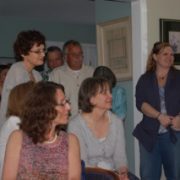On May 31 I retired from the teaching position I held for more than three decades. Last month the English department at Eastern Illinois University had a party for the three of us who were retiring. Actually, the department has two parties every year – at the end of fall and spring semesters – whether anyone retires or not. They’re pot luck affairs, and since many of my colleagues are excellent cooks, I look forward to the food. (And yes, I plan to keep showing up.) The department chairman and his wife host the May party. They have a beautiful house with a large backyard, a lush spread of grass where children can run and play. Because people bring their children, it feels like a family event.
In many ways I yearned for retirement. It meant more time to write and publish books — both my own and those of other authors— through Cantraip Press. More time to blog. More time to play Scrabble and ride my horse. But as the days counted down to the semester’s end, I felt anxiety and sorrow and couldn’t understand why. I wanted to retire! At the party the answer came to me.
I loved teaching in the English department at EIU. Most of the students are a delight, and the world stays fresh when you work with nineteen-year-olds. My colleagues are also friends, better friends than I expected to find in life. I had a schedule that fit my work rhythms and the freedom to design a syllabus that fit my style of teaching. And thanks to our union, a decent salary.
So many people work year after year at jobs they detest, and many others would be grateful for any job at all. I’ve been lucky.
There were generous and thoughtful gifts for us retirees. My colleagues gave me the iPad on which I’m writing this blog and two silver charms that symbolized my two loves, teaching and writing.
Retirement has been good so far, but it’s not without pitfalls. For an introvert and computer junkie like me, social isolation might become a problem. Connecting on Facebook and Twitter is fun, but not the same as interacting with people face to face. And sitting at the computer all day doesn’t make for a full and satisfying life. I’m grateful for my husband, my writing group, and my other good friends. Grateful enough, hopefully, to lift my butt out of the desk chair and spend time with them now and then.
Connected to my penchant for glomming onto the computer is my reluctance to change out of pajamas. Why get dressed, I reason, when nobody sees me except the computer? Oh, and of course my husband, Joe. This habit of mine drives him nuts. He was brought up to believe that naught but worthless slugs lounge through the day in PJs. It’s no use bringing up Proust. Joe will only point out that he’s not married to Proust, he’s married to me, and I should get dressed. NOW! So I put some thought into collecting an at-home wardrobe of pajama-like attire: yoga pants and sweatpants and baggy shorts, oversize T-shirts, and caftans. I even found that mythical garment, the comfortable bra.
But I have no intention of lounging through the day. I have novels to write.
Photo by Casey Sutherland





